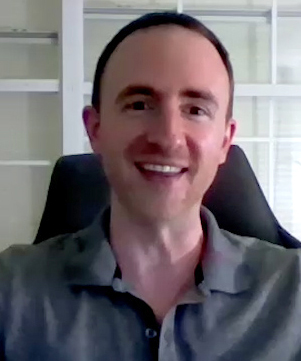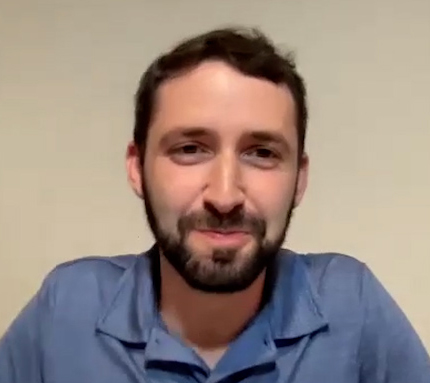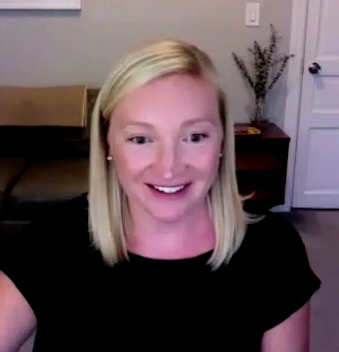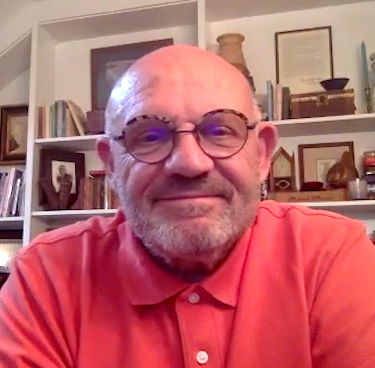 The Stuttering Foundation’s Director of Programs and Education Sara MacIntyre hosted a Virtual Learning panel discussion, Supporting Children who Stutter: A Back-to-School Panel Discussion, with featured guests including Vince Vawter, Tim Flynn, Ben Goldstein, and Ella Jackson.
The Stuttering Foundation’s Director of Programs and Education Sara MacIntyre hosted a Virtual Learning panel discussion, Supporting Children who Stutter: A Back-to-School Panel Discussion, with featured guests including Vince Vawter, Tim Flynn, Ben Goldstein, and Ella Jackson.
The session resulted in a number of gems from our host and panelists, most encapsulating the theme of perseverance and strength through adversity. The panel did an excellent job exposing how stuttering only becomes a handicap if we allow it to consume our consciousness, or as Tim Flynn terms it, "our voice."
The panel debunks, not just with their words but also with their personal stories, that stuttering in and of itself marginalizes someone and condemns them to an unsuccessful, unhappy existence.
The other theme that stood out was peace-in-difference. The panel undermined the false idea of a uniform fluency and the need for everyone to be fluent altogether.
Ella Jackson stresses the importance of “building confidence” and “getting to know them outside of your IEP goals,” and that “there's absolutely nothing wrong with your child or your student who stutters.” In other words, we cannot pigeonhole people and create an arbitrary ideal type. When we do that, everyone who doesn’t fit is ostracized as, to borrow a term from Simone de Beauvoir, the other.
I believe this is where the “double taxation” Jackson discussed derives from. “You're not only hurting yourself,” Jackson said, “but you're hurting other people who can grow and learn, and embrace, and want to be your friend.” In addition to explicitly stating the dual injuries of allowing stuttering to become a setback, the panel implicitly reveals that the effort to help those who stutter is one waged on two fronts: the personal and the social.
Flynn says that we have to teach the student who stutters and the student who does not stutter alike that “difference doesn't mean deficit. Difference doesn't mean wrong, it just means different. And we all are different in our own way.”
Tim Flynn, M.S., CCC-SLP, school-based SLP and person who stutters
 There is so much emphasis put on speaking as fluently as you can, and there's not nearly as much emphasis put on how it makes you feel. So what's the true impact? Is it the child being disfluent or is it the feelings the child has associated with being disfluent?
There is so much emphasis put on speaking as fluently as you can, and there's not nearly as much emphasis put on how it makes you feel. So what's the true impact? Is it the child being disfluent or is it the feelings the child has associated with being disfluent?
You can be an effective communicator no matter if you stutter or not.
There is no magic pill. Chances are if you're a school age child who stutters, you're most likely going to continue to stutter. Now the manner in which you stutter may change, but at the end of the day, you're most likely going to continue to be somebody who stutters.
Ben Goldstein, M.A., CCC-SLP, school-based SLP and person who stutters
 I think one of the most important things is letting kids know that how they talk is okay. They can do anything that they want to do, be who they want to be, join that club or that team at school, and be an awesome kid while stuttering.
I think one of the most important things is letting kids know that how they talk is okay. They can do anything that they want to do, be who they want to be, join that club or that team at school, and be an awesome kid while stuttering.
One thing that we know about stuttering is that the more that we try to hide it and avoid it, the scarier it gets. And the scarier that stuttering is, the more struggle it's going to be. The more fear that we have of stuttering, the less we're going to want to go and make those friends and put ourselves out there, join that club, or raise our hand in class.
Even the best of SLPs can't get rid of all disfluencies.
For kids to be happy and healthy, to make friends, and to be enjoying their lives: those are all really attainable outcomes. That's kind of how I break it down for parents.
Ella Jackson, M.Ed., educator and parent of a child who stutters
 When you say you want to "fix" something it implies that it's broken or that something is wrong with it. There's absolutely nothing wrong with your child or your student that stutters.
When you say you want to "fix" something it implies that it's broken or that something is wrong with it. There's absolutely nothing wrong with your child or your student that stutters.
You can have a great day and stutter all day long. You can be awesome and stutter all day long. Stuttering will not hinder who you will be as a person and as an adult.
Build confidence in a child so that they can find their own voice and understand that their voice has importance and they can change the world. They can't change it by avoiding opportunities to speak and advocate for themselves, or by avoiding opportunities for others to get to know them. These are opportunities to be encouraged and embraced.
Sara MacIntyre, M.A., CCC-SLP, director of Stuttering Foundation Programs and Education
 It's okay to stutter. You are a stutterer and you're okay. Not only is your voice important, we want and need to hear it.
It's okay to stutter. You are a stutterer and you're okay. Not only is your voice important, we want and need to hear it.
If there is a sentence that a child did stutter in, does that mean it wasn't a good sentence just because they stuttered?
Vince Vawter, award-winning author of Paperboy and Copyboy and person who stutters
 Initially, I tried to hide it in every way I could. In my second phase, I took every kind of therapy there was. I worked on it. I took all kinds of therapies. Then I decided, “Wait a minute. I don't have to be fluent. I just have to find my voice."
Initially, I tried to hide it in every way I could. In my second phase, I took every kind of therapy there was. I worked on it. I took all kinds of therapies. Then I decided, “Wait a minute. I don't have to be fluent. I just have to find my voice."
You just have to find that voice, which you have in you. And it's not going to sound like anybody else's, and that's fine.
Stuttering is what we do when we try not to stutter. Okay, once again, stuttering is what we do when we try not to stutter.
From the Fall 2021 Magazine





 Podcast
Podcast Sign Up
Sign Up Virtual Learning
Virtual Learning Online CEUs
Online CEUs Streaming Video Library
Streaming Video Library